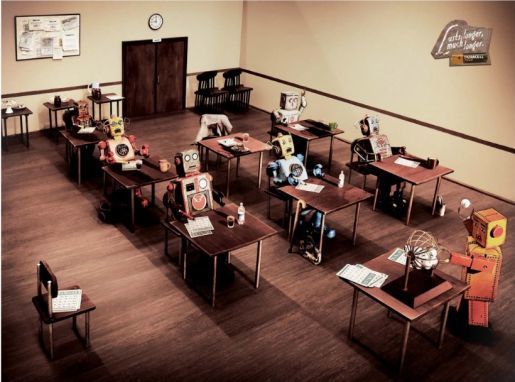Stop Teaching Students WHAT to Think. Teach Them HOW to Think.
For more than a century, we've been creating an industrial workforce of human automatons, built for the purpose of performing routine labor not yet doable by machines. And we've been operating with the mindset that we should teach students the same way we program actual machines. In the 20th century, schooling became a process of information upload in which students are to be filled with all the appropriate data and applications to function as cogs in the machinery of factories and offices, or in the parlance of today, as walking hard drives.

Image source: Inspiration Room
Modern mass production did more than increase efficiency. It chopped up work into simpler components in which one small task could be repeated day in and day out without thought and without knowledge of the whole. Centuries ago, shoes were made by hand, by one skilled person who made the entire shoe. And then hundreds of people became involved in making one shoe with one relatively unskilled person doing nothing but attaching soles all day, every day. Now that machines can perform all the tasks in making an entire shoe, what happens to the humans who were programmed to operate the machines?
Human-automaton creation must end. To succeed in a world of automation will require being as unmachinelike as possible. The entire education system will need to be retooled around no longer teaching kids what to think but how to think. Memorization of facts is pointless in a world where everyone carries around the entire knowledge base of the human species on their person.
The challenge is not information storage but information processing. It's not about information itself but how to use information. The teaching of creativity, curiosity, critical thinking, analytical thinking, problem-solving, and a love of learning itself will be critical to transitioning from the industrial age to the automated age. Learning how to collaborate and empathize with others will be key. To be human is not to be a lone robot performing a singular task in a vacuum but to be a member of the whole of humanity contributing in countless interdependent ways, including even entirely unpaid ways. This will require nothing less than a redefinition of work itself.
Most people when they talk about the future of work are talking about the future of paid work. But the future of work must recognize all work. Take, for example, someone editing Wikipedia, or contributing code to the open-source code-sharing platform GitHub, or even simply taking care of a family member in the same way any paid care worker would. All of that is important work but would be done for purpose, not pay.
It is for this reason that unconditional basic income—a cash stipend starting everyone above the poverty line each month—needs to be a key characteristic of the future of work. That way, as paid work is automated, humans can focus more on all the work that needs to be done, in the ways that most engage them.
For some, there will be jobs as we know them today, although perhaps in far shorter shifts than eight hours a day, five days a week. For others, this will be a return to the universe of self-employed artisanship, in which unique creations are handmade from beginning to end, where platforms, like Etsy, reveal a glimpse of what the future could hold. And for still others, this will be creation for the sake of creation by prosumers, who both create and consume goods and services, all for free, in a new kind of economy built around reputation, instead of remuneration.
To succeed in the future will require rediscovering what it means to be truly human. Mark Twain once said the two most important days in your life are the day you are born and the day you find out why. In the decades ahead, our jobs as humans will be finding our ways to our "whys." And education must be reoriented accordingly.
This article of mine was originally published on Education Weekly as part of their Special Report on Schools and the Future of Work.

Did you enjoy reading this? Please click the subscribe button and also consider making a monthly pledge in support of my daily advocacy of basic income for all.
_large.jpg)
UBI Guide Newsletter
Join the newsletter to receive the latest updates in your inbox.
